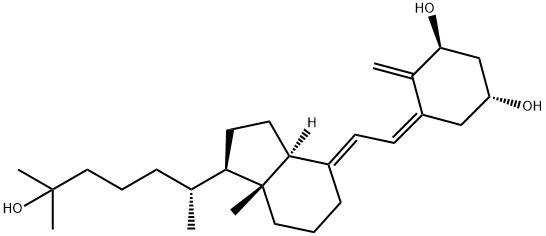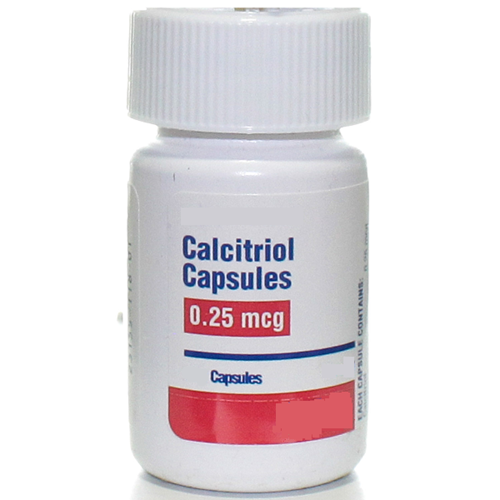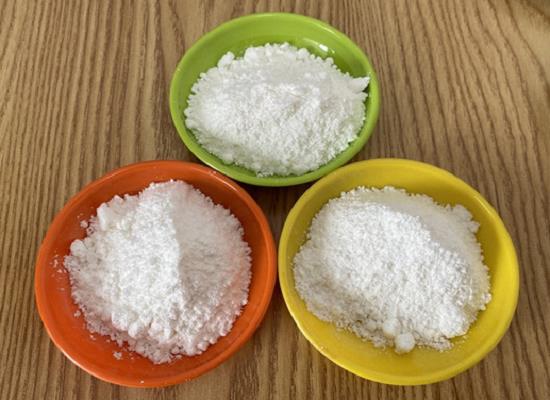The Mechanism of Calcitriol in Cancer Treatment
General Description
Calcitriol, the active form of vitamin D, exhibits multifaceted effects on cancer cells. It induces cell cycle arrest by regulating the expression of CDKs and CDKIs, leading to the accumulation of cells at the G0/G1 phase. Calcitriol also induces apoptosis by down-regulating anti-apoptotic proteins and activating caspases. It affects signaling pathways involved in apoptosis, inhibiting STAT3 activation and modulating ERK1/2 and PI3K pathways. Moreover, calcitriol induces cell differentiation through the inhibition of the Hedgehog pathway, reduction of EGFR expression, and activation of AP-1 and PPAR transcription factors. These mechanisms contribute to the antiproliferative effects of calcitriol on cancer cells.
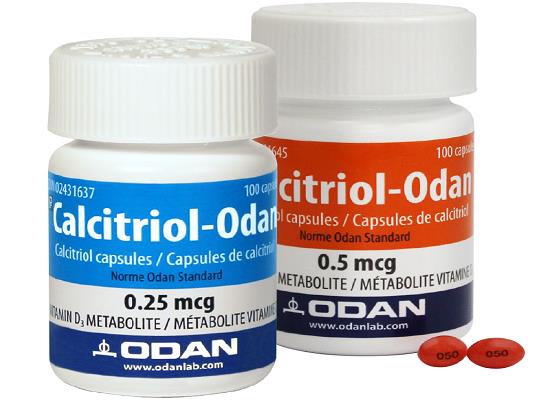
Figure 1. Capsules of calcitriol
Calcitriol Induces Cell Cycle Arrest
Calcitriol, the active form of vitamin D, exhibits antiproliferative effects on cancer cells by inducing cell cycle arrest. It achieves this by regulating the expression of cyclin-dependent kinases (CDKs) and cyclin-dependent kinase inhibitors (CDKIs). Calcitriol increases the expression of CDKIs such as p19, p21, and p27, while reducing the expression of CDK2, CDK4, CDK6, and Cyclin D1. This leads to the accumulation of cells at the G0/G1 phase, causing growth arrest. Additionally, calcitriol modulates cell cycle progression by influencing other crucial growth factors. For instance, it down-regulates Eag1 expression, an oncogenic factor involved in cellular growth. Calcitriol treatment activates FoxO proteins, tumor suppressor transcription factors that control cell proliferation and survival. In prostate progenitor/stem cells, the knockdown of IL-1 prevents the growth-suppressing effects of calcitriol. Calcitriol-induced cell cycle arrest also involves the down-regulation of mitogenic insulin-like growth factors (IGFs) and the up-regulation of IGF-binding proteins (IGFBPs), as well as histone deacetylases (HDACs) 4 and 6. Among the IGFBP gene family, IGFBP3 plays a significant role in inhibiting cancer growth by inducing p21 expression. HDACs, including HDAC3 and HDAC7, can attenuate the calcitriol-dependent induction of the p21 gene, thus facilitating the induction of anti-proliferative target genes. Overall, calcitriol's multifaceted mechanisms contribute to its antiproliferative effects on cancer cells. 1
Calcitriol Induces Cell Apoptosis
Calcitriol has been found to induce apoptosis in various types of cancer cells, including gastric, breast, prostate, pancreatic, and melanoma cancers. The exact mechanisms through which calcitriol induces apoptosis are not fully understood but several key pathways have been identified. One of the mechanisms involves the regulation of anti-apoptotic and pro-apoptotic proteins. Calcitriol down-regulates anti-apoptotic proteins such as Bcl-2 and Bcl-XL, while up-regulating pro-apoptotic proteins like Bax, Bak, and Bad. It also directly activates caspases, a family of cysteine proteases that facilitate apoptosis. In certain cancer cells, calcitriol promotes apoptosis by down-regulating Bcl-2 and p44, and up-regulating caspases-3 and p38 MAP kinase. Calcitriol also affects signaling pathways involved in apoptosis. It inhibits the activation of STAT3, a protein that promotes cancer development and growth, by attenuating its phosphorylation. Additionally, calcitriol can modulate ERK1/2 and PI3K pathways, either activating or inhibiting them depending on the context. The activation of p38 and JNK through the mitogen-activated protein kinase (MAPK) pathway has also been shown to be involved in calcitriol-induced apoptosis in breast cancer cells. Furthermore, calcitriol has been found to enhance the susceptibility of cancer cells to apoptosis when combined with chemotherapy drugs or radiation therapy. This combination treatment increases caspase activation, leading to increased cell death. Overall, calcitriol induces apoptosis in cancer cells through the regulation of anti-apoptotic and pro-apoptotic proteins, modulation of signaling pathways, and synergistic effects with other anticancer treatments. 2
Calcitriol Induces Cell Differentiation
Calcitriol has been shown to induce cell differentiation in neoplastic cells through various mechanisms and pathways. One such pathway is the Hedgehog (Hh) signaling pathway, which is involved in cell differentiation during normal development and cancer progression. Calcitriol inhibits this pathway, leading to differentiation in embryonal rhabdomyosarcoma and basal cell carcinoma cells. Calcitriol also induces differentiation by reducing the expression of the epidermal growth factor receptor (EGFR) and increasing the activity of the AP-1 transcription factor in colon cancer cells. The AP-1 transcription factor is regulated by the MAPK pathways and its activation is crucial for differentiation. Calcitriol increases the phosphorylation of c-Jun through the JNK pathway, and inhibition of p38 MAPK can prevent calcitriol-induced differentiation. Furthermore, calcitriol induces keratinocyte differentiation by up-regulating the expression and activation of peroxisome proliferation-activated receptors (PPAR) and AP-1 through p38 phosphorylation. C/EBP isoforms, such as C/EBPα and C/EBPβ, also play important roles in calcitriol-induced differentiation. Calcitriol increases the levels of these isoforms in HL60 cells, and down-regulation of C/EBP can attenuate calcitriol-induced differentiation. In summary, calcitriol promotes cell differentiation in neoplastic cells through modulation of the Hh signaling pathway, reduction of EGFR expression, activation of AP-1 transcription factor, and regulation of PPAR and C/EBP isoforms. 3
Reference
1. Ma J, Ma Z, Li W, et al. The mechanism of calcitriol in cancer prevention and treatment. Curr Med Chem. 2013;20(33):4121-4130.
2. Trump DL, Deeb KK, Johnson CS. Vitamin D: considerations in the continued development as an agent for cancer prevention and therapy. Cancer J. 2010;16(1):1-9.
3. Gocek E, Studzinski GP. Vitamin D and differentiation in cancer. Crit Rev Clin Lab Sci. 2009;46(4):190-209.
You may like
Related articles And Qustion
Lastest Price from Calcitriol manufacturers

US $0.00-0.00/g2025-04-21
- CAS:
- 32222-06-3
- Min. Order:
- 1g
- Purity:
- 99%min;EP
- Supply Ability:
- 100G
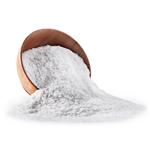
US $3.00/kg2025-04-21
- CAS:
- 32222-06-3
- Min. Order:
- 1kg
- Purity:
- 0.99
- Supply Ability:
- 100000
